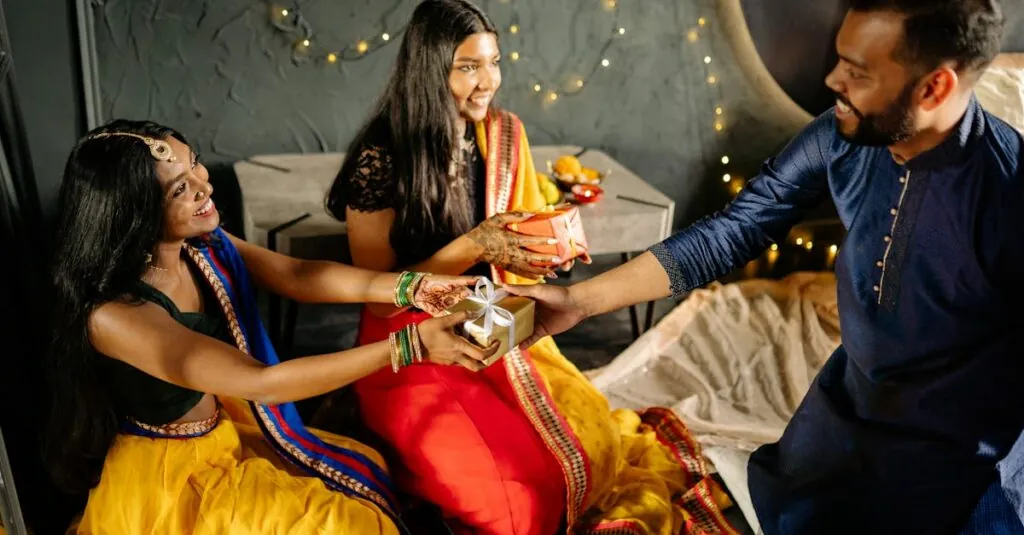In a world where family gatherings often involve awkward silences and a debate over the last slice of pizza, Indian family traditions stand out like a colorful festival in a sea of gray. From the elaborate rituals during weddings to the heartwarming chaos of Diwali celebrations, these customs weave a rich tapestry of love, laughter, and just the right amount of drama.
Picture this: a house filled with the aroma of spices, laughter echoing through the halls, and a grandmother insisting on feeding everyone like it’s her personal mission. Indian family traditions aren’t just about rituals; they’re about creating bonds that last a lifetime. Whether it’s the unbreakable connection with relatives or the delicious food that brings everyone together, these traditions offer a glimpse into a vibrant culture that knows how to celebrate life—one family gathering at a time.
Table of Contents
ToggleOverview Of Indian Family Traditions
Indian family traditions embody rich cultural heritage and diverse practices. Celebrations often revolve around festivals like Diwali, Holi, and Raksha Bandhan, providing opportunities for families to reunite. Wedding ceremonies stand out due to their elaborate rituals and vibrant festivities. These events not only signify the union of two individuals but also strengthen familial bonds through shared experiences.
Strong emphasis lies on respect for elders. Younger generations often seek guidance and wisdom from older family members during significant life decisions. This dynamic fosters a sense of continuity and reverence within families.
Hospitality plays a crucial role in Indian family traditions. Guests are treated with great honor, and families take pride in sharing homemade meals. Traditional dishes represent the regional diversity of Indian culture, showcasing unique flavors and cooking styles.
Celebrating milestones like birthdays and anniversaries involves specific rituals. Families often partake in prayer ceremonies, offering thanks and blessings. These practices reinforce spiritual connections and the importance of family.
Joint family structures remain prevalent in many regions. Living together promotes cohesion and mutual support among extended family members. This arrangement creates a nurturing environment where children learn values from various relatives, enriching their upbringing.
Cultural storytelling also holds significance. Elders narrate folklore and family history during gatherings, preserving traditions for future generations. This practice instills a sense of identity and belonging among family members.
Importance Of Family In Indian Culture
Family plays a crucial role in Indian culture, weaving together strands of tradition, support, and collective identity. Strong familial ties foster a sense of belonging and community across generations.
Strengthening Bonds
Festivals and weddings serve as primary occasions for families to come together. Celebrations like Diwali and Holi create joyful atmospheres that reinforce relationships among relatives. Families also participate in rituals that symbolize unity, such as the tying of the Rakhi during Raksha Bandhan. Shared experiences during these events help cultivate trust and emotional connections. Frequent gatherings for meals further enhance these bonds, with home-cooked dishes reflecting regional flavors and traditions. Additionally, storytelling sessions often led by elders nurture understanding and respect, allowing younger generations to appreciate their heritage deeply.
Support Systems
Indian families function as solid support systems, offering emotional, financial, and social assistance. Extended family members frequently contribute to the upbringing of children, ensuring they receive guidance from multiple sources. It’s common for grandparents to play active roles in children’s lives, providing wisdom and stability. In times of personal crisis or hardship, families unite to offer help, ensuring no one faces challenges alone. Emotional support remains critical during life transitions, such as education or marriage, where family members provide advice and encouragement. This collective support framework not only strengthens individual resilience but also reinforces community bonds, vital for cultural continuity.
Key Rituals And Celebrations
Indian family traditions encompass various rituals and celebrations that strengthen bonds among family members. These occasions highlight cultural values and promote collective identity.
Birth And Naming Ceremonies
Birth and naming ceremonies are significant events in Indian culture, marking the arrival of a new family member. The jatakarma ritual welcomes the newborn, often involving specific prayers for health and prosperity. Afterward, the naming ceremony, known as namkaran, assigns the child a name based on astrological charts and family customs. Families gather to celebrate with traditional food and blessings, fostering joy and unity among relatives. Each of these rituals reflects the family’s values and beliefs, emphasizing the importance of the new addition in their lives.
Marriage Traditions
Marriage traditions in India are elaborate, symbolizing the union of not just two individuals, but also two families. Engagement ceremonies commence the celebrations, often accompanied by exchanges of gifts. The mehendi ceremony sees intricate henna designs applied to the bride’s hands and feet, representing joy and beauty. During the wedding, rituals such as the saat phere, where the couple circles a sacred fire seven times, signify their commitment to each other. Festivities include music, dance, and feasts, reinforcing family ties and cultural heritage. Each element of these traditions showcases the vibrant spirit of Indian celebrations, making weddings memorable events.
Daily Family Life
Daily family life in Indian households showcases the interplay of tradition and modernity, ensuring strong familial connections amid busy schedules.
Role Of Elders
Elders play a pivotal role in Indian families. They are seen as guardians of tradition, offering wisdom and guidance when younger generations face challenges. Their experience in managing family dynamics and life decisions is invaluable. Respecting elders is ingrained in cultural teachings, with younger members often seeking their advice on important matters. Celebrating special occasions like birthdays or marriages often includes elders’ blessings, reinforcing their significance within the family structure. Elders preserve family history through storytelling, connecting generations and fostering identity among family members.
Importance Of Meals
Meals are central to daily family life in Indian homes. Family members often gather for lunch and dinner, creating cherished moments through shared experiences. Diverse regional cuisines spark discussions and showcase cultural heritage. Home-cooked meals not only reflect personal touch but also nurture family bonds. Mealtime serves as a platform for exchanging stories and updates, strengthening relationships. Specific occasions, like festival celebrations, feature elaborate preparations that engage the whole family. Together, preparing and enjoying food underscores unity and connection, highlighting hospitality’s value.
Regional Variations In Traditions
Indian family traditions vary significantly across regions, reflecting the rich tapestry of cultural diversity. Each area showcases unique practices that enhance familial bonds.
North Indian Family Traditions
North Indian family traditions often center around grand celebrations. Weddings involve extensive rituals like the saat phere, symbolizing the couple’s commitment. Families gather for festivals like Diwali, sharing sweets and lighting lamps to signify joy and prosperity. Respect for elders plays a crucial role, with younger generations seeking blessings during important occasions. Birth and naming ceremonies, known for their vibrant festivities, reinforce community ties and family identity. Shared meals during gatherings emphasize hospitality, showcasing regional cuisines that delight all members.
South Indian Family Traditions
South Indian family traditions emphasize spirituality and simplicity. Festivals like Pongal highlight gratitude towards nature, bringing families together in celebration. Special rituals accompany marriage ceremonies, including the Thali tying, symbolizing marital commitment. Elders impart wisdom during significant life events, ensuring cultural continuity. Mealtimes, often featuring traditional dishes served on banana leaves, reinforce family bonds and a sense of togetherness. The practice of storytelling, particularly during festivals, preserves history and strengthens family connections, fostering unity among members.
Indian family traditions create a vibrant tapestry of love and connection that transcends generations. These customs not only celebrate significant life events but also reinforce the importance of unity and support within families.
Through shared meals and joyful gatherings families cultivate strong bonds that stand the test of time. The blend of rituals and regional practices highlights the rich cultural diversity in India, showcasing how each tradition contributes to a collective identity.
Ultimately these traditions play a crucial role in nurturing relationships and preserving cultural heritage, ensuring that the values of respect, hospitality, and togetherness continue to thrive in modern society.



